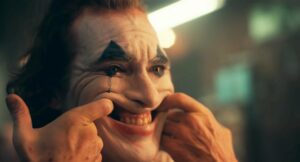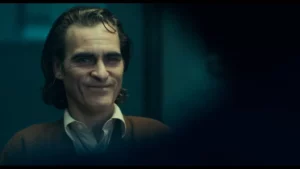Publication Date: 10-03-2024
Joker (2019) review
Dir. Todd Phillips
By: Steve Pulaski
Rating: ★★★
Joaquin Phoenix, his protruding ribcage, and maniacal, frequently contradicting laughter steal the show in Joker, a film bound to leave many the same way it left myself: despondent and craving a pick-me-up. Here is a film that reminds us there are people totally discarded by society, set up to fail from birth, and we couldn’t give less of a damn about their stories. This film is for them, however you want to take that, especially in the age of the daily outrage machine that prompted Joker to be the subject of fabricated controversy before 99% of the world actually saw it. I’ll concede that in the hands of a better director, we could’ve gotten some more style, but that’s about the only controversy I, myself, can conjure.
It truly is time to cut through all the social uproar and concern for violence surrounding a film most of the world hadn’t seen until this weekend. Let’s commence.

Joaquin Phoenix stars as Arthur Fleck, an aspiring stand-up comic who lives in a dingy, low-lit apartment with his out-of-touch mother, Penny (Frances Conroy), as he’s left to care for her, nursing her through incoherent ramblings. Arthur works as a street-clown, trying to provide light entertainment to passersby when they’re not swiping his sign and beating him senseless in alleyways. One particular instance prompts a fellow clown to give Arthur a handgun, but when it falls on the floor of a children’s hospital in the middle of Arthur’s routine, it costs him his job.
Arthur can’t catch a break. In a fit of rage prompted by more violent bullying, he murders three stockbrokers on the subway ride home. When mayoral candidate Thomas Wayne (Brett Cullen) refers to the lower class people of a troubled Gotham City as “clowns,” it prompts those very same underprivileged individuals to hit the streets donning face-paint and clown masks to prove a point in a fit of anarchy. Arthur’s only friend is his neighbor Sophie (Zazie Beetz), who pops up on occasion usually in a consoling or curious fashion. But things really come to a head for him when a late-night talk show host named Murray Franklin (Robert De Niro) plays clips of him bombing a local stand-up routine on his program.
Phoenix is a national treasure and should be treated as such. He gives another immersive performance that has him unhealthily frail and so deeply entrenched in the character it’s hard to advert your eyes. Arthur has a medical condition that causes him to uncontrollably laugh at times, and Phoenix plays it off with absolute conviction, often leaving himself breathless or hyperventilating. It’s a scary performance, one that has him always moving and remaining unpredictable.
So much as been made about the overblown “incel” community and how Joker relates to the type of people who commit mass shootings. Writing the film off as a case of white privilege and insecure men committing violence on innocent people is a shallow and frankly contemptible way to analyze what is ultimately a layered psychological drama. A big part of Joker is about mental illness and the helplessness of a sizable portion of society left behind by eviscerated funding for psychiatric help. Consider the fact that Arthur and his weekly meetings with a local psychiatrist are eliminated thanks to budget cuts that leave him without a doctor and without a source for his seven medications. Add on to that the fact that he should’ve never been put back into his mother’s custody as a young child — foggy paternal details aside — and that he grew up to be a malnourished, erratic individual with no reasonable working skills, and you have someone doomed to fail from the start.
If not for the initial cloying media coverage of the film, part of this flawed discourse may indeed be related to director/co-writer Todd Phillips (working with 8 Mile writer Scott Silver), who admittedly does himself no favors by sending some mixed messaging in the script. It doesn’t take a Batman enthusiast to assume that there is a heaping helping of violence in this film, and Phillips’ portrait of a rejected denizen whose only outlet is to wreak havoc provides a murky answer to what is otherwise an ongoing societal problem. But conversely, what is the answer for someone like Arthur? The only way is suicide, for someone as hopeless as he is. The violence, of course, isn’t justified from a humanistic point-of-view, but for Arthur, it’s the only way to grapple with his emotions, especially after seeing what ramifications his triple murder caused.

In the hands of a more skilled craftsman, Joker might’ve been a film with style that could’ve spawned its own dissertation. The strength of the film’s aesthetics lie in its art direction, handled by the supremely talented Laura Ballinger (The Greatest Showman), and its cinematography littered with graffiti and urban decay (artfully curated by Lawrence Sher, who worked on Godzilla: King of the Monsters earlier this year). Phillips doesn’t do much interesting on the basis of camera angles, which leaves Joker empty on that front. The material is begging for some stylistic range that would pepper an otherwise beautifully ugly movie with some directorial mystique. Before Phillips became a household name after some of the most successful raunchy comedies ever made, i.e. The Hangover and Old School, he made a handful of documentaries, such as the filthy Hated, about shock rocker GG Allin, the unaired HBO short Frat House, and even one on the band Phish. He has range. What he lacks is a defining style and it’s never been more apparent than in Joker.
Yet even the flaky presence of directorial flair can’t vastly derail what is ultimately a glum but timely picture about society’s outcasts. Above its surprisingly deft and loyal connections to the Wayne dynasty, as part of the larger Batman universe, Joker is an intense psychological picture with attention-to-detail on a segment of the population that would be lucky to be humanized with a human interest piece on local cable networks. It is a rallying cry, but not necessarily the harmful one you might assume.
My review of Joker: Folie à Deux
Starring: Joaquin Phoenix, Frances Conroy, Zazie Beetz, Brett Cullen, and Robert De Niro. Directed by: Todd Phillips.
About Steve Pulaski
Steve Pulaski has been reviewing movies since 2009 for a barrage of different outlets. He graduated North Central College in 2018 and currently works as an on-air radio personality. He also hosts a weekly movie podcast called "Sleepless with Steve," dedicated to film and the film industry, on his YouTube channel. In addition to writing, he's a die-hard Chicago Bears fan and has two cats, appropriately named Siskel and Ebert!


